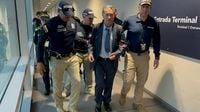Carlos Lehder, a notorious figure in the history of Colombian drug trafficking and one of the founders of the Medellin Cartel, was arrested on March 28, 2025, upon his arrival at El Dorado International Airport in Bogota. This arrest marks a significant moment, occurring 38 years after he was extradited to the United States, where he served a lengthy prison sentence for his criminal activities.
Lehder, who is now 75 years old, returned to Colombia from Frankfurt, Germany, where he had lived since his release from a U.S. prison in 2020. Upon landing, Colombian immigration officials discovered an active arrest warrant against him, prompting his immediate transfer to the National Police for further processing. According to Migration Colombia, "Lehder Rivas, who arrived in the country from Frankfurt, presented in our systems of information an active arrest warrant." This warrant is reportedly linked to a 24-year prison sentence for illegal arms trafficking and other related charges.
General Carlos Fernando Triana, director of the National Police, confirmed that Lehder was taken to a police unit in Bogota to verify his judicial situation. He stated, "We are verifying Lehder's judicial situation. At this moment, we are transferring him to a police unit in Bogota to confirm his legal status in Colombia." The details surrounding the warrant and its implications for Lehder's future remain unclear.
Lehder's criminal legacy is deeply intertwined with the violent history of drug trafficking in Colombia during the 1980s. He was a key player in the Medellin Cartel, which was notorious for its brutal tactics and vast cocaine distribution networks. Alongside infamous drug lord Pablo Escobar, Lehder helped orchestrate the logistics for transporting cocaine to the United States, utilizing Cayo Norman, a small island in the Bahamas, as a central hub for operations.
Born in Armenia, Quindío, Colombia, on September 3, 1949, Lehder's rise in the drug trade began in the 1970s. He was known for his extravagant lifestyle and eccentricities, which included a fascination with the Beatles, particularly John Lennon. He famously erected a statue of Lennon at his estate, La Posada Alemana, which became a symbol of his wealth and excess.
In 1978, Lehder proposed a controversial deal to then-President Alfonso López Michelsen, offering to pay off Colombia's external debt in exchange for a free hand in drug trafficking. His brazen approach to politics and his role in the cartel exemplified the intertwining of crime and governance during a tumultuous period in Colombian history.
Lehder was arrested in February 1987 amid a broader crackdown on drug traffickers in Colombia. He was extradited to the United States, where he was sentenced to 135 years in prison. His sentence was later reduced after he cooperated with U.S. authorities, providing testimony against former Panamanian dictator Manuel Antonio Noriega, who was also implicated in drug trafficking.
After spending 33 years in various U.S. prisons, Lehder was released in June 2020 and subsequently deported to Germany, where he sought to live a quiet life away from the spotlight. However, in interviews following his release, he claimed he had never participated in any murders, distancing himself from the violent reputation he had earned during his criminal career. In one such interview, he stated, "I never participated in any assassination or conspiracy. I chose to defend my life in circumstances where it was life or death. But never against the Colombian government." This assertion starkly contrasts with the violent legacy associated with the Medellin Cartel.
The recent return of Lehder to Colombia raises many questions. Why did he choose to come back after years in Germany? What prompted the active arrest warrant? And could he face new charges or even a second extradition? As authorities continue to investigate his current legal standing, the implications of his return resonate deeply within a society still grappling with the scars of its narcotics past.
Lehder's arrest comes amid a resurgence of interest in the legacies of Colombian drug lords. In December 2024, another former Medellin Cartel associate, Fabio Ochoa Vásquez, returned to Colombia after serving time in the U.S. Additionally, a book containing the posthumous memoirs of Gilberto Rodríguez Orejuela, a rival of Lehder and former head of the Cali Cartel, was published earlier this year, further reigniting discussions about the era of drug trafficking.
As the Colombian public watches closely, the narrative of Carlos Lehder continues to unfold—a story of power, corruption, and the enduring impact of the drug trade on Colombian society. The outcome of his recent arrest will likely shape the ongoing dialogue about justice, accountability, and the legacy of the Medellin Cartel.







